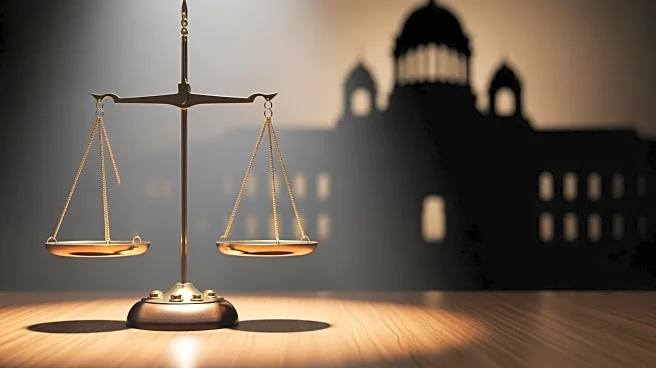What's Happening?
The Supreme Court is currently reviewing President Trump's ability to impose unilateral tariffs under the 1977 International Emergency Economic Powers Act (IEEPA). This case represents a significant legal
challenge to Trump's presidency, as it questions whether the emergency law grants the president near-limitless power to set and change import duties. The Constitution traditionally assigns tariff levying powers to Congress, but the Trump administration argues that the emergency law includes tariffs. Conservative justices, including Neil Gorsuch, have expressed concerns about the potential shift of power to the president, which could have trillion-dollar implications for the global economy. The case involves tariffs imposed on imports from Canada, China, and Mexico, as well as reciprocal tariffs on most countries.
Why It's Important?
The outcome of this case could have profound implications for U.S. economic policy and executive power. If the Supreme Court limits Trump's tariff authority, it could restrict the president's ability to unilaterally influence trade policy, potentially affecting international relations and the U.S. economy. Small businesses have argued that the uncertainty surrounding these tariffs is pushing them towards bankruptcy, highlighting the economic stakes involved. A ruling against Trump could also set a precedent for limiting executive power in other areas, reinforcing the constitutional principle that Congress holds the power to levy taxes and tariffs.
What's Next?
The Supreme Court's decision is expected to take weeks or months, and it could lead to significant changes in how tariffs are imposed. If the court rules against Trump, the administration may need to find alternative legal avenues to impose tariffs, which could involve more restrictions. Additionally, the government might face the complex task of issuing refunds for the import taxes already collected under the emergency powers law. The decision could also influence future administrations' use of emergency powers, potentially leading to legislative changes to clarify the scope of presidential authority.
Beyond the Headlines
This case touches on broader themes of executive power and constitutional law, particularly the nondelegation doctrine, which questions whether powers reserved for Congress can be used by other government entities. The outcome could influence how future presidents approach foreign affairs and trade policy, potentially leading to a reevaluation of the balance of power between the executive branch and Congress. The case also highlights the ongoing debate over the limits of presidential authority in the context of national emergencies.











